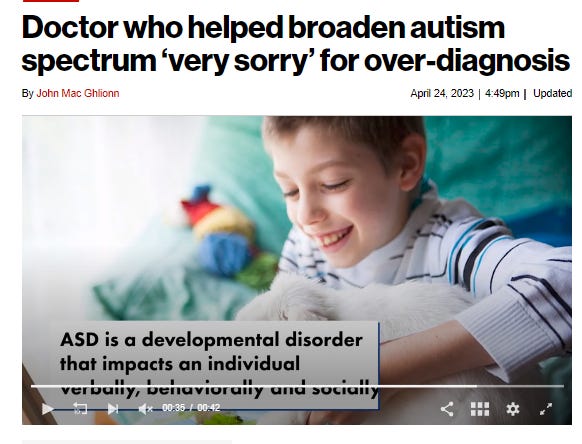Staggering Admission from Doctor on his role in autism over-diagnosis
I came across this stunning story yesterday and wanted to share it with you.
Frankly, I can’t say that I’m surprised but I find it deeply sad and something tells me it won’t get much media coverage.
Dr. Allen Frances gave an interview to the New York Post in which he laments his pivotal role in broadening the autism diagnosis criteria, or in his words “loosening the definition of autism” for the DSM-IV (the guidebook psychologists and psychiatrists use to diagnose mental disorders), which led to a massive increase in the number of diagnosed autistic disorders, both in children and adults. (He also has a relatively recent book addressing these claims and the excessive medicalization of otherwise normal conditions or neurological variations).
It is hard to overstate the dire ramifications of this. In the 1970s, reported rates of autism in the United States increased from < 3 per 10,000 children to > 30 per 10,000 children in the 1990s, a 10-fold increase (source).
In 2020, autism spectrum disorders are now prevalent in about 1 per 36 children and are 4 times more common in boys than in girls, according to CDC data. Autism diagnoses also correlate with income, meaning children residing in more affluent areas are 80% more likely to receive an autism diagnosis than those in less affluent communities.
The DSM is used worldwide by mental health professionals, so this loosening of definitions and easing of diagnosis is not solely an American problem. After a positive autism spectrum diagnosis, children often enter a medication pipeline with mood-altering drugs from different categories taken simultaneously, such as stimulants, antidepressants, and antipsychotics. All of this, before the teen years even start, and while there are certain conditions that warrant medication, it is deeply concerning how common and frequent it has become.
Like with other aspects of childhood and adolescence, there is a tendency to almost joyfully welcome a mental health diagnosis and lean on it, as if to make it an identity of its own. I hope you give this short interview a read and find it insightful.




Shocking but not surprising at the same time. I wonder if the ADHD phenomenon (significant increase in diagnosis) is linked to a change in criteria as well.
I just finished a piece linking autism and transgenderism. Interesting stats. https://collettegreystone.substack.com/p/why-are-we-so-fascinated-with-transgenders